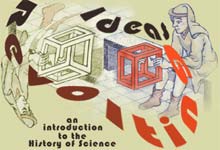
University of California, Irvine
Instructor: Dr. Barbara J. Becker

|
Week 3. Humanism Revolutionaries vs. Reactionaries
|
Supplementary readings for Week 3's lectures include excerpts
from:
|
De Revolutionibus opens with a foreword addressed to the reader followed by a preface and dedication to Pope Paul III. For many years it was simply (and quite logically) assumed that Copernicus had written them both. But careful readers weren't so sure: the words in the foreword contradict those in the preface!
Did Copernicus view his new system of the world as a convenient mathematical abstraction, or did he really believe it represented the physical structure of the world. It was a question only Copernicus himself could answer. Unfortunately, according to his friend Tiedemann Giese, "[Copernicus] had lost his memory and mental vigor many days before; and he saw his completed work only at his last breath upon the day that he died."
Years later, German mathematician, Johannes Kepler investigated the matter and unveiled the foreword's mystery author: Andreas Osiander, a Lutheran theologian who, in the final stages of the book's prolonged publication process, had assumed full responsibility for seeing it through the press.
Copernicus had the basic structure of his new system of the world sketched out perhaps as early as 1510. Why do you think he waited 30 years to make his ideas public?Is Copernicus a revolutionary or a reactionary?
How does Kepler's attitude about putting his ideas into print compare with that of Copernicus? Was Kepler asking questions about the structure of the world that would be considered "scientific" today?
How would you characterize Paracelsus' views on astronomy? How does the "art" differ from the "science" of astronomy?
Although Copernicus, Kepler and Paracelsus had very different notions on what it meant to "do" astronomy, they did share a belief in the intrinsic harmony of the structure and purpose of the celestial realm. If these three could meet for lunch one day, what do you think they would talk about?
|